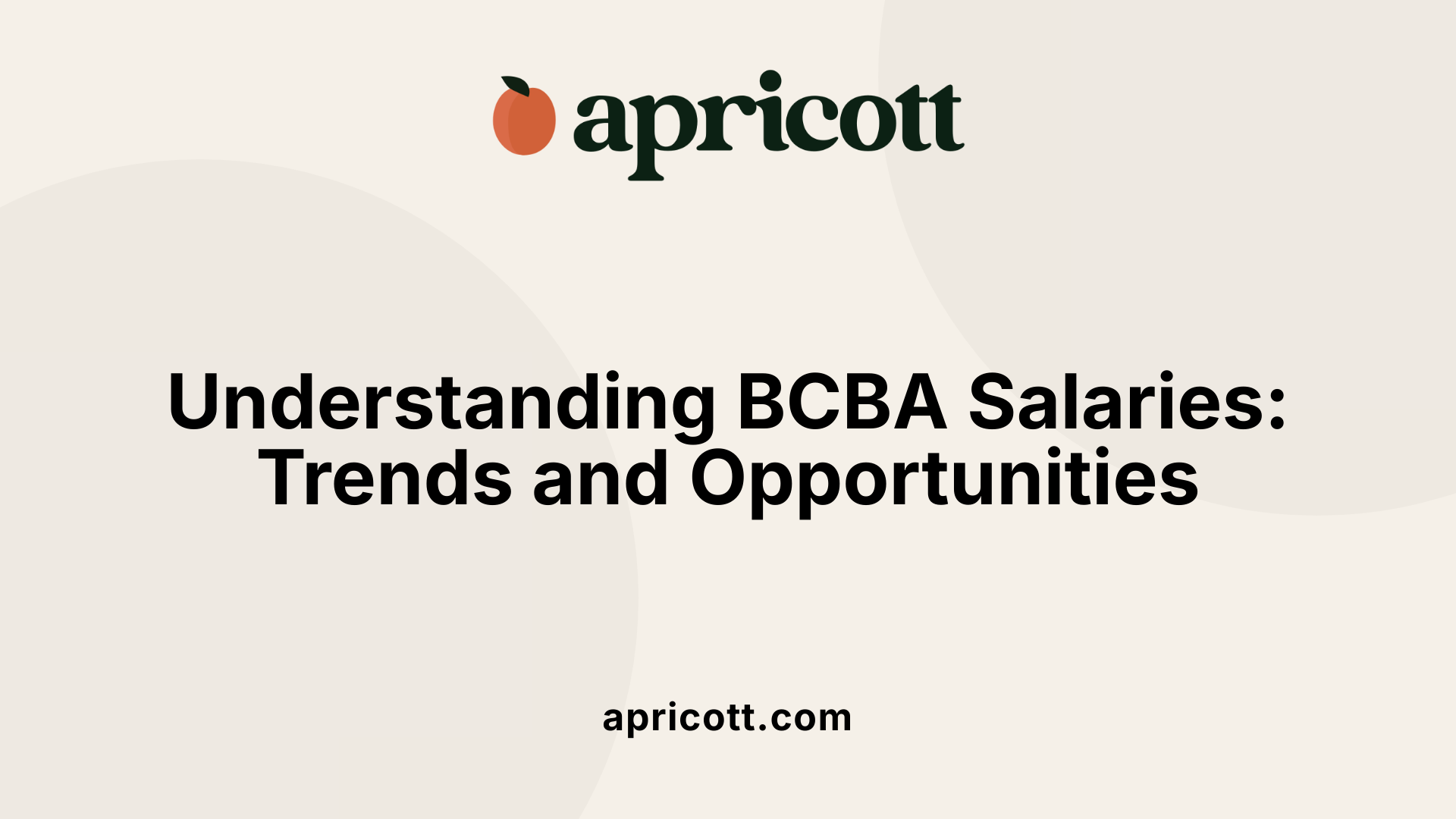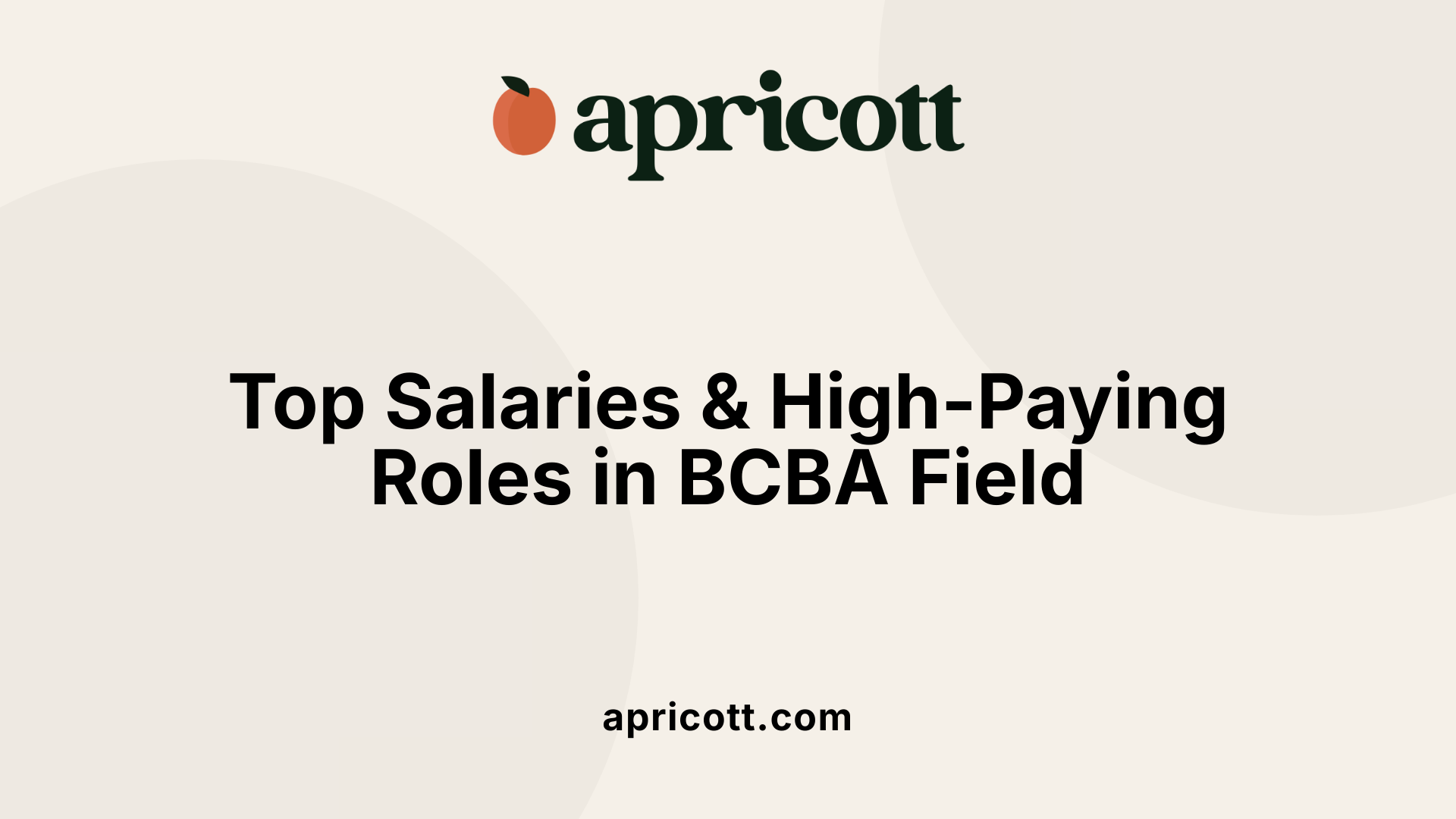August 25, 2025
Unlocking the Earning Potential of Behavior Analysts in the U.S.
The field of behavior analysis has seen remarkable growth over recent years, driven by increased awareness, broader insurance mandates, and rising demand for specialized services. At the core of this expansion are Board Certified Behavior Analysts (BCBAs), whose salaries reflect a complex interplay of geographic, experiential, and industry-specific factors. This article delves into the current earning potential of BCBAs across the United States, examining salary ranges, influential factors, and future industry trends.

The typical annual salary for a Board-Certified Behavior Analyst (BCBA) in the United States falls within a broad range depending on location, experience, and specific industry. Overall, most BCBAs earn about $75,784 to $89,075 each year. According to recent data, the average salary hovers around $89,075 annually.
Salaries tend to be higher in metropolitan areas and states with greater demand for behavioral health services. For example, in high-cost states like California and New Jersey, the average salaries can rise significantly, frequently surpassing $100,000 per year. BCBAs with specialized credentials or advanced degrees, such as the BCBA-D, are often earning between $106,871 and $118,000.
This variation highlights the importance of geographic location and professional experience. BCBAs working in private practices or as part of behavioral health organizations tend to see higher compensation. Generally, the core salary range for BCBAs in 2023 is from the mid-$70,000s to the high $80,000s, with top earners making well over $100,000 in certain states or specialized roles.
The median annual salary is approximately $72,450, but experienced professionals and those working in high-demand regions can earn upwards of $83,000 annually. Entry-level BCBAs and those working in less populated areas may earn less, around $56,000 to $60,000, especially in regions with lower living costs or fewer clinical opportunities.
Professionals in the top 10% of the field—often those with extensive experience, advanced certifications, or leadership roles—can earn about $83,187 annually or roughly $40 per hour. High-level roles such as behavior analysis directors or senior clinicians can command salaries close to or exceeding $100,000, with behavioral health directors earning about $112,000.
In some cases, travel BCBAs, who work across multiple sites, earn between $75,000 and $125,000, with top earning professionals reaching over $132,500 annually.
Starting salaries for new BCBAs in the field tend to be lower, generally ranging from $55,000 to $65,000 depending on the state and employer. In Florida, for instance, entry-level salaries have been reported around $27,910 in some areas, but can reach over $100,000 with experience or in specific regions.
Overall, the BCBA salary landscape offers promising growth prospects, especially as the demand for behavioral health services continues to expand nationwide.
| Salary Range | Approximate Annual Earnings | Typical Experience/Role | Notes |
|---|---|---|---|
| Entry-Level | $27,910 - $65,000 | New graduate or early career | Varies by region and employer |
| Median | $72,450 - $83,000 | Mid-level experience | Averaging across the country |
| Top 10% | Over $83,187 | Senior roles, directors | Includes traveling BCBAs |
| Highest Salary | Over $112,000 | Leadership, private practice | Pay can exceed $150,000 in some cases |

The salary spectrum for board-certified behavior analysts (BCBAs) varies broadly across the United States. On average, BCBAs earn around $89,075 annually, with the nationwide range typically falling between approximately $73,532 and over $132,500. Entry-level professionals beginning their careers may earn between $50,000 and $60,000, while seasoned BCBAs with several years of experience or in leadership roles can command salaries exceeding $100,000. Top-tier professionals, particularly in high-demand locations or specialized settings, have the potential to earn well over $150,000.
Leadership positions such as behavior analyst directors often reach salaries close to $100,000. High-level roles like behavioral health directors can earn around $112,000, and clinical behavioral directors make approximately $85,000. Professors in behavior analysis also enjoy lucrative salaries around $88,000.
Travel BCBAs, who work on a contract basis across different locations, can see their annual earnings range from $75,000 to as high as $125,000, with some earning up to $132,500. Geographic location plays a significant role; for instance, California and New Jersey offer some of the highest average salaries, with California BCBAs earning around $90,556 and New Jersey professionals averaging $95,532.
Private practitioners often set hourly rates approaching $100 or more, especially for in-home services where personalized attention is valued. This translates into annual earnings that can surpass typical salaried positions, depending on the number of clients and hours worked.
| Percentile | Annual Salary Range | Notes |
|---|---|---|
| 25th Percentile | ~$70,000 | Entry-level or less experienced professionals |
| 75th Percentile | ~$89,500 | More experienced BCBAs |
| 90th Percentile | >$120,000 | Top earners in the field |
The ongoing growth of the industry, driven by increasing demand for behavioral services, indicates that salaries are likely to rise further. Geographic and professional factors, such as location, experience, and role, significantly influence earning potential, making the BCBA a financially rewarding career in many regions of the country.

Several elements play a crucial role in determining the earning potential of board-certified behavior analysts (BCBAs). Geographic location is a major influence, with states like California, New York, and New Jersey offering the highest average salaries—up to approximately $98,000 to $95,000 annually. Metropolitan areas within these states, such as Santa Cruz, CA, and New York City, can see salaries exceeding $110,000, partly due to the higher cost of living.
Experience and education also significantly affect pay. BCBAs with more years of professional experience, especially those with advanced degrees or specialized training, tend to earn more. For example, entry-level salaries in Florida can start around $27,910, while seasoned professionals with over ten years of experience can earn upwards of $107,950 annually.
The industry or workplace setting further influences compensation. Leadership roles, such as behavior analyst directors or behavioral health directors, often command six-figure salaries—around $85,000 to over $112,000. Private practice practitioners, particularly those offering in-home services, may charge hourly rates approaching $100, which can translate into higher overall annual income.
Additionally, sectors like healthcare, education, or private consulting offer different earning opportunities. For instance, private practitioners or specialists working in behavioral therapy for autism spectrum disorder with insurance coverage have higher potential earnings.
Here’s a summary table illustrating how location, experience, and industry impact BCBA salaries:
| Factor | Typical Impact | Example Locations/Details |
|---|---|---|
| Geographic Location | Higher salaries in urban, high-cost states | California (~$90,556), New York (~$84,615) |
| Experience | Increased pay with more years and advanced degrees | Entry-level (~$27,910), Experienced (~$107,950) |
| Industry/Workplace | Leadership roles and private practice earn more | Directors (~$100,000+), private practitioners (~$100/hr) |
Understanding these variables allows aspiring and current BCBAs to strategically plan their career paths, potentially targeting high-paying markets and gaining relevant experience and specializations.

The future for behavior analysts looks very promising, with a significant increase in job opportunities expected in the coming years. From 2023 to 2024, the industry forecast indicates a growth rate of approximately 58%, far exceeding many other fields. This surge is driven largely by rising diagnoses of autism spectrum disorder (ASD) and broader insurance coverage for behavioral therapy, which makes services more accessible.
Salaries for behavior analysts vary depending on experience, location, and specific roles. The average annual salary for certified behavior analysts (BCBAs) generally ranges from about $72,450 to nearly $89,075. Top-tier professionals with advanced experience or leadership roles can earn substantially more, sometimes exceeding $112,000 annually. For instance, behavioral health directors and private practitioners in lucrative markets or regions can reach these higher income levels.
Diverse employment settings—such as schools, healthcare facilities, government agencies, and private clinics—offer various pathways for career development. Recognized top-paying states like California, Massachusetts, and New York also reflect regional wage differences, with some cities like Santa Cruz offering salaries over $112,000.
Industry growth is further supported by the expanding ABA market, projected to reach almost $6 billion by 2033. This expanding market not only highlights the increasing demand for behavioral services but also signals ample opportunities for career advancement and financial growth.
Overall, behavior analysts can look forward to a stable and enriching career. With rising demand, continuous growth, and the potential for higher earnings through specialization and leadership, this profession presents a compelling choice for those passionate about making a difference in people's lives while achieving professional and financial success.
Yes, some BCBAs do earn six-figure salaries, particularly those with extensive experience, specialized skills, or roles in high-demand regions or industries. For instance, senior BCBAs, behavioral health directors, and private practitioners charging premium rates often surpass the $100,000 mark.
Many BCBAs working in private practice can charge hourly rates approaching or exceeding $100, especially for in-home services. These higher rates reflect the personalized nature of private therapy and can significantly boost annual income. In cities like Santa Cruz, CA, private BCBAs earn around $112,456 annually, highlighting the earning potential in private settings.
Salary levels for BCBAs vary depending on geographic location, experience, and employer type. BCBAs can enhance their earning potential through continuous professional development, gaining specialized certifications, and developing negotiation skills. Roles such as behavior analyst directors or clinical behavioral directors typically offer higher salaries, around $85,000 to over $100,000.
Specializing in certain areas, such as behavior analysis for autism or working as a behavioral health director, can lead to higher salaries. High-demand states like New Jersey, Wisconsin, and Nevada offer average annual earnings above $90,000, reflecting the value placed on specialized skills.
Additional factors that influence income include experience level, with seasoned BCBAs earning significantly more than entry-level practitioners. For example, Florida BCBAs with ten-plus years of experience can earn up to $107,950 annually.
To increase earning potential, BCBAs should seek advanced certifications, specialize in high-demand fields, and consider geographical shifts to higher-paying states or cities. Building a private practice and negotiating effectively for higher rates can also make a substantial difference.
Overall, the field's strong growth outlook and regional variations present numerous opportunities for BCBAs to enhance their income through strategic career planning.

The typical annual salary for a Board Certified Behavior Analyst (BCBA) in the United States generally ranges from approximately $75,784 to $89,075. More precise figures suggest an average closer to $89,075 per year. However, this varies significantly based on location, experience, education, and employer type.
In major metropolitan areas and high-paying states like Alaska, California, and New Jersey, salaries tend to be higher, often exceeding $100,000. For instance, BCBAs in Santa Cruz, CA can earn around $112,456 annually. Conversely, in less populated or lower-demand regions, salaries may fall towards the lower end of the spectrum.
Advanced credentials like BCBA-D or terminal degrees further boost earning potential. BCBAs with these qualifications or extensive experience can earn between $106,871 and $118,000 or more annually. Private practice providers, especially those offering in-home services, can command hourly rates approaching and exceeding $100.
The outlook for BCBA salaries looks promising, with the field experiencing rapid growth. From 2021 to 2022, employment in behavior analysis was projected to grow at a rate of approximately 23%, far surpassing the average for all professions. This surge is driven by increased awareness of behavioral health treatments and expanded insurance coverage, particularly notable since Florida’s 2008 statutes mandated insurance coverage for autism spectrum disorder treatments.
Salary prospects are also influenced by geographic demand, with states such as New Jersey, Wisconsin, and Nevada offering top average wages above $90,000 annually. Travel BCBAs enjoy variable earnings, with some earning up to $132,500 based on demand and staffing needs.
In the longer term, the demand for qualified behavior analysts is expected to remain high, bolstered by ongoing research, policy changes, and societal focus on behavioral health. This will likely lead to increased salaries, especially for experienced professionals and those in high-demand regions.
| Location | Average Salary (USD) | Notable Factors |
|---|---|---|
| California | $90,556 | High demand, metropolitan hubs |
| New York | $84,615 | Dense population, healthcare centers |
| Massachusetts | $81,210 | Academic and medical institutions |
| Illinois | $75,994 | Major metropolitan areas |
| Florida | up to $107,950 | State mandates, insurance coverage |
| Private Practice | Up to $100+ per hour | In-home services, independent practice |
As the demand continues to grow, both entry-level and experienced BCBAs can expect upward salary trajectories, especially in markets showing high demand and limited supply of qualified professionals.
The demand for qualified behavior analysts continues to grow rapidly, driven by industry expansion, increased recognition of autism spectrum disorders, and broader insurance coverage. Salaries are expected to rise further, especially for those with experience and specialization. Whether pursuing entry-level positions or high-level leadership roles, BCBAs can anticipate a dynamic and lucrative career path in the coming years, with opportunities for significant earnings and professional development.